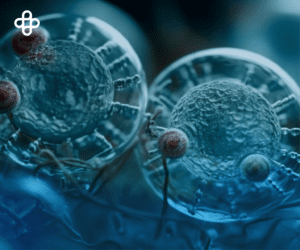Alzheimer’s disease, a degenerative form of dementia, affects millions of people worldwide and poses significant challenges for patients, their families, and the medical community. As the global population ages, the search for effective treatments has intensified. In this context, regenerative medicine has emerged as a promising field that could hold the key to better understanding and treating Alzheimer’s disease. This article will explore the connection between regenerative medicine and Alzheimer’s, highlighting the latest scientific advancements.
What is Regenerative Medicine?
Regenerative medicine is an interdisciplinary field that seeks to restore the structure and function of damaged tissues and organs by stimulating the body’s natural healing mechanisms. It relies on the use of stem cells, gene therapy, tissue engineering, and biomaterials to regenerate and repair damaged tissues.
Regenerative Medicine in understanding Alzheimer’s Disease and Its Challenge
Alzheimer’s disease is characterized by the buildup of beta-amyloid protein plaques and neurofibrillary tangles in the brain, leading to the progressive loss of nerve cells and a decline in cognitive functions. However, conventional treatments have focused on alleviating symptoms rather than halting or reversing the underlying degenerative process.
Regenerative Medicine and its Innovative Approach
Regenerative medicine offers an innovative and hopeful approach in the fight against Alzheimer’s. In particular, scientists are exploring various strategies to tackle the disease from different angles.
Firstly, Stem Cell Therapy shows promise. Stem cells have the ability to differentiate into different types of brain cells and replace damaged cells. This potential makes them a significant focus of research in the field.
Secondly, Gene Therapy aims to correct the genetic defects associated with Alzheimer’s. By introducing healthy genes into affected brain cells, researchers hope to slow down the progression of the disease.
Another approach is Tissue Engineering, which focuses on the development of artificial tissues and organs that can replace damaged structures. Within the realm of Alzheimer’s, scientists are working on creating brain models in the lab to study the disease and test new treatments.
Additionally, Biomaterials offer exciting opportunities. These materials, such as three-dimensional scaffolds, provide a suitable environment for the growth and regeneration of brain cells. Scientists are investigating how biomaterials can promote tissue regeneration in the brains of Alzheimer’s patients.

Challenges and Future Perspectives
While regenerative medicine holds promise in the fight against Alzheimer’s, significant challenges remain. Scientists face technical, ethical, and regulatory hurdles in the development and application of these therapies. Furthermore, further research is needed to fully understand the underlying mechanisms of the disease and find effective therapeutic approaches.
Conclusion
Regenerative medicine represents a new frontier in the battle against Alzheimer’s disease. Although a definitive cure is still far off, advancements in this field offer renewed hope for patients and their families. Understanding the mechanisms of the disease and developing regenerative therapies could eventually change the course of this debilitating condition and improve the quality of life for those affected. As research progresses, it is important to support and foster regenerative medicine as a promising approach in the fight against Alzheimer’s.

I invite you to read our article, What are stem cells?





